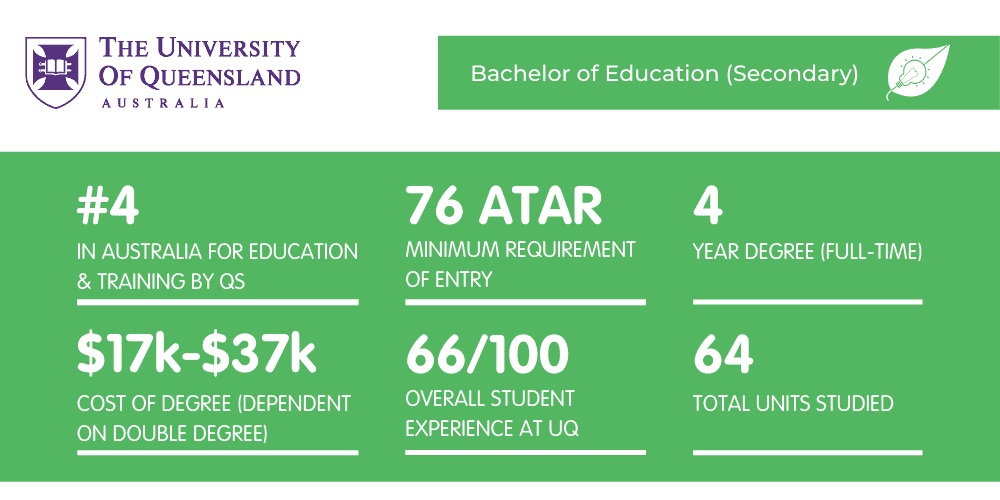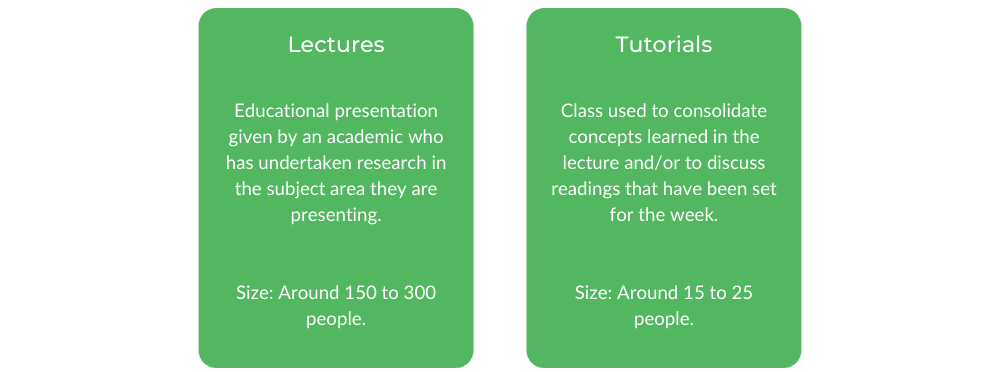So, it’s time to think about your uni enrolments and you’ve got your eyes set on studying Secondary Education. But, what university is the best choice for you? Perhaps Secondary Education at UQ is an option you’ve considered.
With the help of third-year Secondary Education student, Alexandra, we’ll take you through what you need to know about the degree. We’ll be going through the core units, the placements, the nitty-gritty of assessments and classes and, of course, the best extra-curricular activities you should join to meet new friends.
Keen to know more? Just keep reading on!
What is a Bachelor of Education (Secondary) at UQ?
Core Units for this Degree
How to Get into a Bachelor of Education (Secondary) at UQ
What’s the Teaching Format?
What’s the Faculty and Culture Like?
What is a Bachelor of Education (Secondary) at UQ?
A Bachelor of Secondary Education at UQ is a 4-year degree that mixes your area of expertise and a passion for teaching. It paves a career pathway into working as a high school teacher anywhere in Queensland, as well as for Australian and international independent schools.
On campus, you’ll learn teaching methods, school-based assessment planning, inclusivity perspectives and other topics which will prepare for classroom teaching. Right from the first year of study, you’ll also gain professional experience through school visits and supervised placements.
Being a high school teacher means having an area of expertise, meaning a Bachelor of Secondary Education is studied with a second degree of your choice. At UQ, there are five double-degree options:
- Bachelor of Arts
- Bachelor of Science
- Bachelor of Music (Honours)
- Bachelor of Mathematics
- Bachelor of Business Management
All these degrees, with the exception of a Bachelor of Music (Honours), include a choice of majors, which will help you further specialise your knowledge. Since you’ll be well prepared for classroom teaching by the end of your four years’ study, there is no Honours degree that you have to study (and, none offered for that matter!).
Career Paths
Of course, most Bachelor of Secondary Education graduates choose to work as high school teachers — however, there are other options that graduates can choose, which include careers based on their second degree and working behind the scenes for Australian secondary education:
- Education project officer
- Education policy officer
- Education advocate
- Private tutor
Learn about other careers you can pursue with a Bachelor of Education here!
Core Units for this Degree
Neatly, all the units in Bachelor of Secondary Education at UQ are core units besides the Professional Curriculum units! While the first two years of the course are quite light in terms of workload, the third and fourth year amps up in difficulty through professional placements and the amount of Education units you study.
First Year
The two first-year Education units are A Sociological Orientation to Education and Learning and Development for Educators. A Sociological Orientation to Education and Learning is a foundational course into the social context of education, specifically with sociological issues (such as positionality, identity, and decolonising knowledge) and how to mindfully respond to cultural and learning diversities.
The unit, Learning and Development for Educators, is your first industry placement! It offers a 5-day field experience at a high school setting, where you’ll examine the learning and development theories discussed in the first two months of the semester.
Second Year
The three second-year Education year units are Literacies within and across the Curriculum, Indigenous Knowledge and Education and Teachers as Educational Innovators and Agents of Change.
The first two units are studied on campus, where you examine 21st century literacy-learning issues. You’ll learn to recognise and implement strategies to resolve accessibility issues regarding literacy in the classroom, such as incorporating Aboriginal and Torres Strait Islander principles into your teaching practice.
Teachers as Educational Innovators and Agents of Change is your second industry placement and is another 5-day field experience at a high school setting. This time, you’ll be focussing on using information and communication technologies to innovate new ways of teaching.
Third Year
The third-year is where you’ll finish all your theoretical core units, and where it gets considerably more tough in your course! You’ll engage further with high school industry placements in Numeracy across the Curriculum and, your first 15-day professional experience, Building Professional Knowledge.
While you’ll be learning the duties and responsibilities of being a teacher during your professional experience, the theoretical unit Building Inclusive Secondary Classrooms explores approaches to supporting diverse learning needs.
Fourth Year
Units in the fourth and last year are tailored to your professional future as an ethical and values-based high school teacher. This includes the year-long Curriculum Studies unit, where you’ll go through the specific topics, teaching sequences and assessment tasks in junior and senior subjects.
Each semester, you’ll have a 30-day professional placement, which you’ll reflect on in a capstone research project of your choice.
School Practicum Placements
The school practicum placements are one of the best elements in the course, and everyone always looks forward to them!
Right from the first year, you’ll go on placement to a school! Placements start off with more observational tasks, where you watch how classes are taught and follow teachers.
This gradually becomes incorporated with a few teaching tasks and lessons. In the final year, it gets right up to full teaching placements, where you plan lots of lessons for the class.
How to Get into a Bachelor of Education (Secondary) at UQ
The ATAR cut-off for Secondary Education at UQ depends on your second degree. If your second degree is Bachelor of Arts or Music, the cut-off is 76.00. Science and Business Management is 80.00, while the cut-off for a Bachelor of Mathematics is 94.00.
Alternate Pathways
Of course, there are a couple of alternative pathways if you don’t meet the cut-off. The Subject Incentive Scheme offers up to 5 adjustment points if you have studied and achieved a grade of C or higher in Specialist Mathematics or 2 or a Language other than English.
Prerequisites
Although there are no additional assessments to entry, there are two prerequisite subjects for the course (this excludes the pre-requisites for your second degree!):
- Queensland Year 12 (or equivalent) General English subject (Units 3 & 4, C)
- General Mathematics, Mathematical Methods or Specialist Mathematics (Units 3 & 4, C)
If you’re interested in studying Primary Education at UQ, learn more here!
Scholarships
Unfortunately, there are no Education-specific scholarships offered at UQ. The UQ Academic Scholarships Program is your best bet for scholarships and is based on academic merit.
For example, the $6000 UQ Merit Scholarships are awarded to those who have achieved a minimum ATAR of 95.00 and demonstrate their leadership/community service achievements.
The UQ Link Scholarship is also offered to students who have experienced educational disadvantage due to financial hardship, where the recipient is awarded $3,000 per year for up to 3 years.
What’s the Teaching Format?
Secondary Education at UQ is studied in semesters. Lectures and tutorials are the two classes you’ll have for the Education units.
The fun part is that Education has set cohorts, so the peers you meet in your first-year classes you will end up sticking with year after year until you graduate!
A typical class structure is a 2-hour lecture followed by a 1-hour tutorial. However, in the last two years, classwork is more engaging and you’ll have a 2-hour tutorial.
Class Structure
Lectures
Lectures are incorporated into all units, as they are an efficient way to learn the basics of the weekly topic, from sociological perspectives to learning methods. The lecturer goes through Powerpoint slides, videos and, sometimes, a small Q&A.
Lecture class-sizes have, on average, about 150 people. Some courses are merged with primary students, so lectures have up to 300 people!
Tutorials
Tutorials are great opportunities for working with other pre-service teachers. Here, you’ll talk to your peers, meet new people and make friends, which is always the best.
And, of course, there is also tutorial work. This typically involves discussing the various readings from textbooks and articles. For tutorials, a normal classroom has between 15 to 25 students.
There is more variety with your second degree classes — for example, Science has a mix of lectures, tutorials, contact sessions and practicals.
How much time do you spend in class?
Since most of your Education units are shared with your second degree, there is usually only 3 hours of contact hours per week for your Education classes.
When you undertake your full-time school placement in the fourth year, 30 school days are added to your contact hours.
Assessments
For theoretical units in Education, the main assessment types include written tasks. For units with professional placements, there is usually a portfolio and a reflective component.
Written tasks can be anything from literature reviews, essays to annotated bibliographies. Students typically respond with academic evidence on how real-world and hypothetical issues in education can be navigated appropriately. Most assessment pieces in education are heavy weighted, around 20-60% per assignment.
For units with professional placements, there are also “lesson plan” assessments, where you’ll create your own classroom teaching schedule.
In fourth year, there are portfolio assessments to complete for your teaching license, where you summarise, reflect and state your personal teaching philosophy based on your professional experiences.
Skills That You Refine and Learn
Completing a Bachelor of Education (Secondary) at UQ provides students with three core skills: leadership, communication and decision-making. These are all highly transferable skills to their future workplaces.
As pre-service teachers, students will learn how to lead the classroom full of diverse learning needs and perspectives. In order to equally teach the content, pre-service teachers learn to lead a healthy classroom dynamic through strong and inclusive leadership tactics.
For teachers, communication is important for their students, colleagues and parents/carers. A good approach to teaching requires a quality mix of verbal, written and digital communication with their classroom, as well as a strong degree of emotional intelligence and empathy.
Classrooms can be quick-paced environments and that’s why becoming familiar with contemporary learning perspectives allows for pre-service teachers to prepare for most scenarios. Combined with their professional placements, pre-service teachers figure out their personal teaching philosophy which will guide their decision-making process.
What’s the Faculty and Culture Like?
Faculty
The Education faculty is one of the friendliest at UQ. The Education faculty is a small community, so it is easy to get to know the usual staff and they are always willing to help with your questions!
They have their own section on the HASS (School of Education) website, which is very easy to use and access everything for your entire degree, including timetables for placements, how to get your Blue Card and everything necessary to work in school settings.
Societies
The Education Society is student-run and every year puts on events for education students and their friends. There are academic, social and community events run almost every week and are full of the friendliest people always willing to help!
Being in a cohort with the same students every year is a great way to make long lasting friendships.
Mentoring and Support Programs
While there are no education-specific mentoring programs, UQ offers mentoring programs for first-semester students to ease the transition from school to university life. Throughout the semesters, there are also study-skills workshops that offer general study guidance for students.
In turn, you can become a student mentor for high school students through the Young Achievers Program at UQ. This will definitely provide extra experience for budding pre-service teachers!
Lynn Chen is a Content Writer at Art of Smart Education and is a Communication student at UTS with a major in Creative Writing. Lynn’s articles have been published in Vertigo, The Comma, and Shut Up and Go. In her spare time, she also writes poetry.






